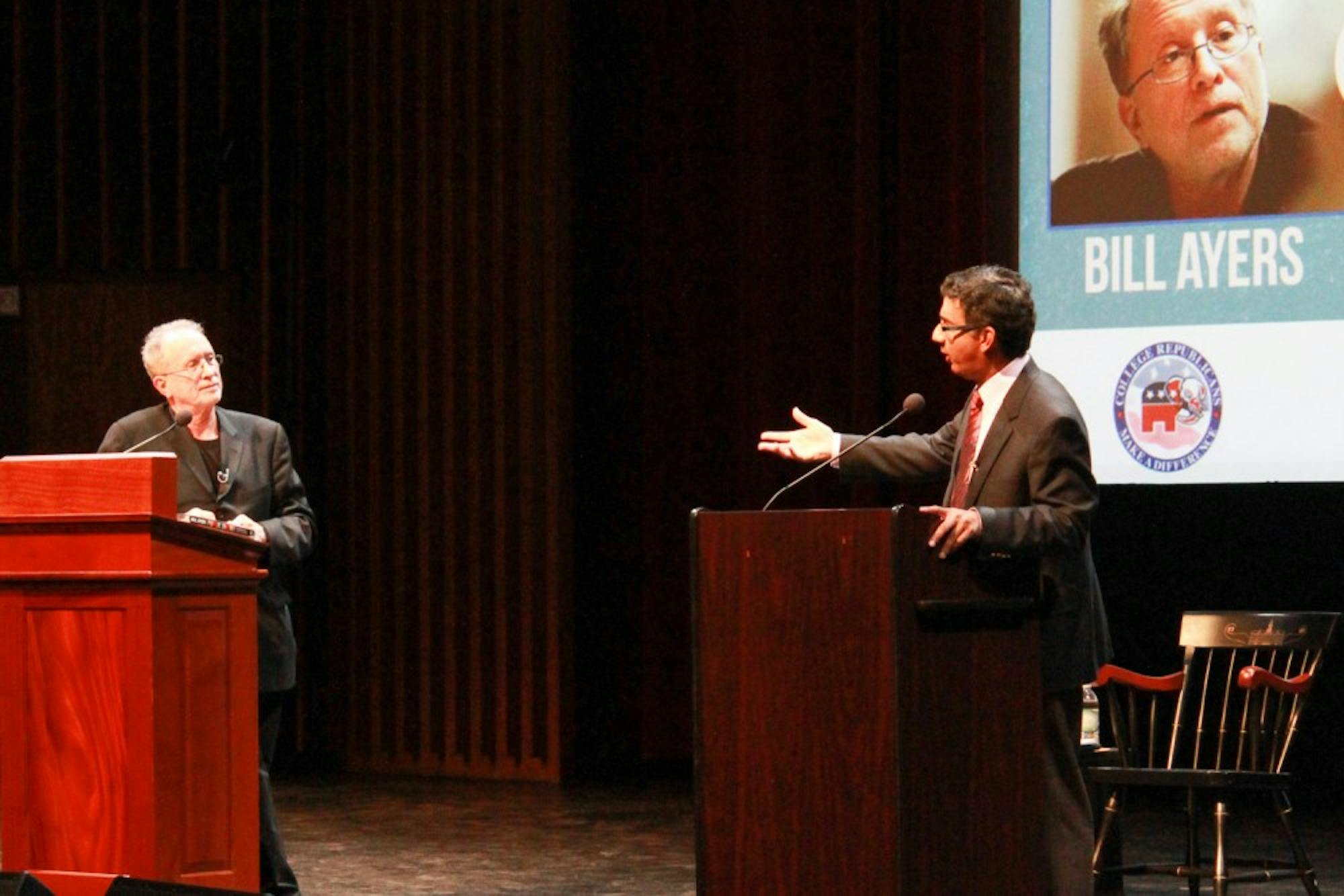In front of over 400 students, faculty and community members, conservative commentator Dinesh D’Souza ’83 and former antiwar activist Bill Ayers expressed their conflicting ideologies while debating America’s role in the world on Thursday night. While Ayers pushed for stronger gun control and universal suffrage, saying that the U.S. Constitution should be open to change, D’Souza discussed wealth creation and opportunities that the nation offers.
The debate began with two 18-minute periods during which D’Souza and Ayers outlined their views on what makes the United States a great nation. D’Souza and Ayers then spent five minutes each rebutting their opponent’s arguments before cross-examining one another.
D’Souza began the cross-examination with a question directed at his opponent’s radical past, pointing out that Ayers participated in the bombing of public buildings such as the U.S. Capitol and Pentagon in the 1970s in response to U.S. involvement in the Vietnam War.
“You sounded totally different today,” D’Souza said. “You talked about teaching, you talked about being an educator, you talked about Socratic doubt and wonder. So my question is, what happened to that old revolutionary? Is he still alive, or has he thrown in the towel?”
Ayers said he remains a revolutionary but no longer uses violence to seek to overthrow the government. Instead, he is focused on finding peace and justice.
D’Souza and Ayers then fielded questions from the audience on topics ranging from the Israeli-Palestinian conflict to LGBTQ rights.
One student asked D’Souza about allegations that he had discriminated against LGBTQ individuals during his time as editor of The Dartmouth Review.
D’Souza responded by saying he believes that America is a “minority of one,” and does not believe in special rights for specific populations.
Before addressing the questions, D’Souza and Ayers each spent almost 20 minutes each outlining the reasons they believe the U.S. is great.
Ayers began his time at the podium by describing his experience as a Chicago native, reminiscing about famous Chicagoans like The Blues Brothers, Al Capone and President Barack Obama.
While discussing political power, Ayers said social movements should begin among citizens and not public officials.
“The reality is that there’s also power in the neighborhood, the workshop, the community, the university,” Ayers said. “That’s the power we have access to.”
Ayers said Progressive Era reformer Jane Addams exemplified America’s greatness. Ayers said that all activists, including feminists, socialists and radicals, have acted in solidarity with the people and are part of what makes America great. Ayers also discussed the spirit of democracy, the inspiration of liberty and the pursuit of social justice. Using anecdotes and historical examples, Ayers asked the audience to open their eyes, act and rethink those actions.
D’Souza began his speech by discussing his immigration from India, and the challenge of maintaining his dual perspective of the U.S., as both an insider and outsider. After criticizing Ayers’s idea of social justice, D’Souza said the U.S. is responsible for wealth creation, which he characterized as the world’s greatest invention. Historically, wealth was acquired through theft and conquest, D’Souza said, but the American invention allows people to practically create something out of nothing.
D’Souza referenced America’s founders, who he said created a society that would be devoted to wealth creation through trade, technology and entrepreneurial capitalism. D’Souza said technology and inventions are the key to American success and affluence.
“What’s so impressive to me about America is that the ordinary guy, the not-so-great, not-so-smart, hardworking guy, still has a great life,” D’Souza said. “What America really offers is the chance to write the script of your own life.”
Ending with a discussion of foreign policy, D’Souza asked the audience what the 20th century would have been like without the U.S. By acting in its own self-interest, the U.S. has made the world a better place, he said.
After questions from the audience, Ayers and D’Souza delivered closing remarks and signed books outside the auditorium.
Chad Rairie ’16, who attended the lecture, said he thought both D’Souza and Ayers discussed topics that need to be addressed in America, but he wondered if Ayers was as outspoken and true to his beliefs as D’Souza during the debate.
Emmanuel Hui ’17 said he was disappointed with the questions students asked D’Souza and Ayers after the debate.
“Student questions, every single one of them, they didn’t really grasp the points of the other side,” Hui said. “They asked questions that almost made me embarrassed to be a Dartmouth student.”
The Dartmouth Review editor Nick Desatnick ’15 introduced Ayers and D’Souza and said the debate would focus on America’s nature and meaning in the world today.
D’Souza’s visit to the College attracted national attention after his indictment last week for allegedly redirecting $20,000 in campaign contributions to Wendy Long ’82 in her 2012 Senate race.




